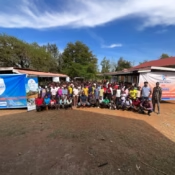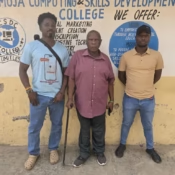
Saturday, June 21st was different. After five weeks of online sessions with these 25 entrepreneurs through Global Impact Innovators’ Monday-Wednesday-Friday program, I thought I knew them well. But when it comes to entrepreneurship in Sierra Leone, nothing replaces face-to-face connection.
But there’s magic in moving from screens to faces, from chat messages to animated discussions.
These entrepreneurs had traveled from across Southern and Eastern Sierra Leone – Kenema (65km), Moyamba (85km), Bonthe (150km by challenging roads), Kailahun (185km), Pujehun (120km), and Rutile (70km). Each journey represented a leap of faith in their learning investment.
Our focus was laser-sharp: understanding customers.
Not just who buys your products, but who they really are, what keeps them awake at night, and how your solution fits their world.
The transformations were immediate. The cassava processor from Moyamba stopped talking about “processed flour” and started describing “convenient nutrition for busy mothers.” The phone accessories entrepreneur from Kenema realized his real customers weren’t phone owners – they were people whose livelihoods depended on staying connected.

The breakthrough exercise
Each entrepreneur had to present their business from their customer’s perspective. The agricultural entrepreneur from Kailahun shifted from promoting “high-quality seeds” to offering “peace of mind for worried farmers.” The solar entrepreneur from Rutile realized she’d been focusing only on sales, ignoring the crucial post-purchase experience that turns customers into advocates.
One entrepreneur from Pujehun, developing logistics for cocoa farmers, discovered his real barrier wasn’t price – it was trust. Farmers had been exploited for generations; any new solution had to address relationship dynamics, not just efficiency.
By day’s end, these 25 entrepreneurs had transformed their entire approach. They stopped seeing customers as targets to convince and started viewing them as partners to serve.
As one participant put it: “I thought I was selling water pumps. Now I realize I’m selling hope – hope that children won’t walk kilometers for clean water, that families won’t lose days to illness, that communities can focus on growth instead of survival.”

Why Global Impact Innovators works beyond Freetown
The most innovative solutions come from people closest to the problems. Agricultural innovations emerge from farmers who understand soil challenges. Logistics solutions come from traders navigating poor roads daily. Financial inclusion products are designed by people who’ve experienced banking exclusion.
These entrepreneurs don’t just identify opportunities – they live them.
Our blended approach – combining consistent online training with intensive bootcamps – lets entrepreneurs build knowledge systematically while maintaining their businesses and families. As we continue toward our July sessions, they’re implementing concepts in real-time, bringing evolving challenges back to our community for collective problem-solving.
Sierra Leone’s entrepreneurial spirit is alive and thriving beyond Freetown. Our job isn’t teaching them to think like entrepreneurs – they already do. We provide tools, frameworks, and connections to amplify their natural innovation and turn solutions into sustainable, scalable businesses.
Find out more about our adventures in Sierra Leone at Global Impact Innovators.
Author
Charles Kebbi
By Global Impact Innovators



